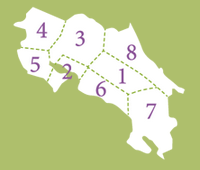Smart ideas to change the way we use (and waste) the water.
Why change our small consumer habits if those in power continue behaving the same old way? Never underestimate the power of ONE.
If we demand other products and other options, the government and companies will have to adapt their attitudes. These are only small changes but if we all make them, they will represent a big change. The changes asked of us are not difficult, we are not even asked to give up our comforts…just make small and feasible adjustments.
In this series dedicated to the planet we will review, water, energy, garbage and Co2 amongst other important issues. This first issue will address something very vital: Water conservation.
Water everywhere?
As young children we were repeatedly taught that ¾ of the planet is covered by water and this seemed like an enormous number. However, once we grew up a little, we realized that we cannot drink the ocean’s water as is and … that only 3% of the water in the planet is fresh water. When we now realize that the world population’s rapid increase in the last 15 years has led to 3x the previous demand, it becomes clear that conflicts about this vital element are inevitable.
Everyone can do “something” and if we all do it at the same time, we can do “plenty”.
In the bathroom:
- Close the faucet while shaving or brushing your teeth.
- Do not open the faucet all the way; open it only as much as needed. Regulating the water coming into the house is the best way to control your usage. ( If you already have a weak water flow at your house, you have even more reason to watch your usage!)
- Instead of taking a bath, take showers which use 10 times less water (this saves up to 20,000 liters of water a year).
- Shampoo and detergents are contaminants. They must be used in moderation and as much as possible opt for biodegradable products.
- Keep the shower water running only when you are using it, turning it off while using soaps and other prodcuts. Do not soap up under the running shower, you will be using more soap which will contaminate that water even more.
In the kitchen:
- Do not wash food under a running faucet. Use a container. Upon finishing, this water can be reused to water the plants.
- Never dump oil in the sink. It floats over the water and is very difficult to eliminate, preventing bacterial decomposition.
- When washing dishes, first wet the dishes and then close the faucet while you soap them.
- Think carefully whether it’s really worth it to buy bottled water instead of using tap water. It increases the energy expense in its production and creates future residuals (plastic bottles). Refill bottles with tap water, close and shake them, then open them again to allow the chlorine gas from the movement to escape from the bottle. Keep these bottles in the refrigerator.
In the garden:
- Always water the plants early in the morning or after dusk to prevent the loss of water through evaporation.
- Place mulch around your plants to cover the soil and reduce evaporation, this also prevents unwanted plants from growing and it keeps the soil healthier.
- Water hoses can lie around spilling water. Use a regulator with automatic shut off.
- Drop irrigation is the most efficient method and yields better savings.
- Inspect the water meter at your house when you are not using water, to see if you may have any leakages. Repair the leaks without delay. A toilet that is not functioning properly can waste up to 200 gallons of water per day. 10 drops of water per minute represents 530 gallons of water wasted per year
In other activities:
When doing laundry, use the water/energy saving setting on your washing machine. Try to use just the minimum amount of water and detergent necessary to get your clothes clean.
To wash your car, use a bucket with soap and water and only use a hose to do your final rinse.
Anywhere in the world:
Do not throw any kind of trash into the ocean, rivers or lakes. Actually, don’t throw trash anywhere other than into trash cans, the wind and the rain will carry it to the water.
Be very careful with motor oil. Just a few drops can contaminate a large water supply.



